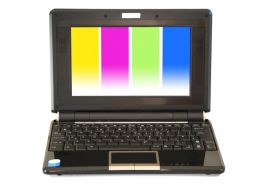Nigel Paine subscribes to a different definition of mobile learning, as we understand it. We’ll let him elaborate.
Do you remember when ‘elearning’ was a dynamically sophisticated term that described something radically new in the field of learning and development? I have to admit to being there at its conception, birth and early childhood. It feels a long time ago.
The term was used to describe learning that was delivered on a computer, so it described a kind of distance learning, but electronic. It was a useful catch-all term for something quite sophisticated, challenging and new. Now, some 20 years later the term is more confusing than accurate. It engenders more arguments than it clarifies and is poorly defined.
The reason is that there are so many great pieces of learning that could be described as elearning, that the difference between the extremes of what could come under that banner is so great as to render the term effectively useless. A program that delivers an electronic document which requires little more than virtual page turning for interactivity, is hardly in the same electronic universe as a dynamic exploration of a virtual world. Yet both lay claim to the term elearning. Hardly helpful, descriptive or clarifying! Having listened to endless presentations trying to pin the term down so that it covers ‘my output’ rather than ‘their output’, I have come to the conclusion that it is all simply ‘learning’. The degree of electronic processing involved is neither here nor there and not a defining characteristic.
 "In a world where your phone, your laptop and your 7 or 9-inch tablet are increasingly sophisticated and interchangeable in function, what people actually crave is multi-platform learning rather than mobile learning"
"In a world where your phone, your laptop and your 7 or 9-inch tablet are increasingly sophisticated and interchangeable in function, what people actually crave is multi-platform learning rather than mobile learning"
I think that we are in exactly the same position now with mobile learning. It is a term that has already had its day. It is now so broad, so unsophisticated and so unhelpful a term as to be meaningless. Let me explain. Mobile learning started life as ‘learning on your mobile phone’. Mobile learning was exactly what it said on the tin. But in a world where your phone, your laptop and your 7 or 9-inch tablet are increasingly sophisticated and interchangeable in function, what people actually crave is multi-platform learning rather than mobile learning per se.
If it runs on your company-supplied, locked-down lap top, you could call it ‘mobile’ ie it runs outside your office physically, but not outside your office literally, as it is still confined to live inside your firewall. But what you want is something, or a variant of something, that runs on your iPad, and your smartphone as well as your laptop and your office-based desktop. That is your definition of mobile: multi-platform in some shape or guise, and anything that does not meet your needs is not what you ordered and simply not mobile enough. In essence the term has gravitated from defining place, to defining options but the term has not evolved with it.
The notion of working remotely is so complex and widespread that it no longer defines anything particularly. The notion of ‘multi-platform’, however, still poses challenges and makes demands on providers. The sooner the customer starts to say what he or she means, and demands, not just mobile but multi-platform instead, the faster we will get to the place that is obviously our next destination: what we need, delivered when we need it, in the appropriate way and on our platform of choice. Then we will be truly agnostic in terms of time and place (apart from that pesky small point about wi-fi and its lack of ubiquity). So in conclusion, I hope we all begin to shout, preferably in unison, ‘mobile learning is dead, love live multi-platform!’ And then, maybe we will get it.
Nigel Paine is a coach, mentor, writer, broadcaster and keynote speaker of international acclaim. He is currently working in Europe, Brazil, the US and Australia on a variety of assignments, that hinge around making work more creative, innovative and aspirational and making workplaces more conversational, team-based and knowledge sharing. You can read his blog at www.nigelpaine.com or follow him on Twitter: http://twitter.com/ebase
Nigel Paine subscribes to a different definition of mobile learning, as we understand it. We'll let him elaborate.
Do you remember when 'elearning' was a dynamically sophisticated term that described something radically new in the field of learning and development? I have to admit to being there at its conception, birth and early childhood. It feels a long time ago.
The term was used to describe learning that was delivered on a computer, so it described a kind of distance learning, but electronic. It was a useful catch-all term for something quite sophisticated, challenging and new. Now, some 20 years later the term is more confusing than accurate. It engenders more arguments than it clarifies and is poorly defined.
The reason is that there are so many great pieces of learning that could be described as elearning, that the difference between the extremes of what could come under that banner is so great as to render the term effectively useless. A program that delivers an electronic document which requires little more than virtual page turning for interactivity, is hardly in the same electronic universe as a dynamic exploration of a virtual world. Yet both lay claim to the term elearning. Hardly helpful, descriptive or clarifying! Having listened to endless presentations trying to pin the term down so that it covers 'my output' rather than 'their output', I have come to the conclusion that it is all simply 'learning'. The degree of electronic processing involved is neither here nor there and not a defining characteristic.
 "In a world where your phone, your laptop and your 7 or 9-inch tablet are increasingly sophisticated and interchangeable in function, what people actually crave is multi-platform learning rather than mobile learning"
"In a world where your phone, your laptop and your 7 or 9-inch tablet are increasingly sophisticated and interchangeable in function, what people actually crave is multi-platform learning rather than mobile learning" I think that we are in exactly the same position now with mobile learning. It is a term that has already had its day. It is now so broad, so unsophisticated and so unhelpful a term as to be meaningless. Let me explain. Mobile learning started life as 'learning on your mobile phone'. Mobile learning was exactly what it said on the tin. But in a world where your phone, your laptop and your 7 or 9-inch tablet are increasingly sophisticated and interchangeable in function, what people actually crave is multi-platform learning rather than mobile learning per se.
If it runs on your company-supplied, locked-down lap top, you could call it 'mobile' ie it runs outside your office physically, but not outside your office literally, as it is still confined to live inside your firewall. But what you want is something, or a variant of something, that runs on your iPad, and your smartphone as well as your laptop and your office-based desktop. That is your definition of mobile: multi-platform in some shape or guise, and anything that does not meet your needs is not what you ordered and simply not mobile enough. In essence the term has gravitated from defining place, to defining options but the term has not evolved with it.
The notion of working remotely is so complex and widespread that it no longer defines anything particularly. The notion of 'multi-platform', however, still poses challenges and makes demands on providers. The sooner the customer starts to say what he or she means, and demands, not just mobile but multi-platform instead, the faster we will get to the place that is obviously our next destination: what we need, delivered when we need it, in the appropriate way and on our platform of choice. Then we will be truly agnostic in terms of time and place (apart from that pesky small point about wi-fi and its lack of ubiquity). So in conclusion, I hope we all begin to shout, preferably in unison, 'mobile learning is dead, love live multi-platform!' And then, maybe we will get it.
Nigel Paine is a coach, mentor, writer, broadcaster and keynote speaker of international acclaim. He is currently working in Europe, Brazil, the US and Australia on a variety of assignments, that hinge around making work more creative, innovative and aspirational and making workplaces more conversational, team-based and knowledge sharing. You can read his blog at www.nigelpaine.com or follow him on Twitter: http://twitter.com/ebase
 "In a world where your phone, your laptop and your 7 or 9-inch tablet are increasingly sophisticated and interchangeable in function, what people actually crave is multi-platform learning rather than mobile learning"
"In a world where your phone, your laptop and your 7 or 9-inch tablet are increasingly sophisticated and interchangeable in function, what people actually crave is multi-platform learning rather than mobile learning" "In a world where your phone, your laptop and your 7 or 9-inch tablet are increasingly sophisticated and interchangeable in function, what people actually crave is multi-platform learning rather than mobile learning"
"In a world where your phone, your laptop and your 7 or 9-inch tablet are increasingly sophisticated and interchangeable in function, what people actually crave is multi-platform learning rather than mobile learning"




